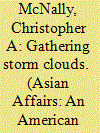| Srl | Item |
| 1 |
ID:
116302


|
|
|
|
|
| Publication |
2012.
|
| Summary/Abstract |
In the 40 years since Fiji became independent, there has been no shortage of perspectives from which to frame its development: its colonial past, its dual status as a Third World and Pacific island state, and, most pervasively perhaps, race conflict. This article focuses on another perspective: the failure of ethnic Fijian leaders to democratise their community politically and economically. Its consequences for the country have been long-standing and lie behind Fiji's developing coup culture.
|
|
|
|
|
|
|
|
|
|
|
|
|
|
|
|
| 2 |
ID:
073561


|
|
|
|
|
| Publication |
2006.
|
| Summary/Abstract |
This article explores the dynamics of capitalist development in the three political economies of Greater China. We have two purposes in mind. First, we hope to produce a fresh understanding of Mainland China's economic rise, interpreting it as associated with the process of late capitalist development. Second, we use a comparison with Taiwan and Hong Kong to examine whether China has converged with or diverged from four salient aspects of late capitalist development: the character of state ruler incentives, or the "will to develop"; the nature and structure of state-society relations; the role of business enterprises and business networks in supporting initial capitalist accumulation; and the transition of state-business interactions over time from mutual distrust to engagement and cooperation. In so doing, we hope to use comparative analysis to integrate the crucial case of China into broader inquiries on the nature and logic of capitalist development.
|
|
|
|
|
|
|
|
|
|
|
|
|
|
|
|
| 3 |
ID:
086836


|
|
|
|
|
| Publication |
2009.
|
| Summary/Abstract |
In this article, the author puts China's recent economic boom and its possible consequences into broader perspective, arguing that China is experiencing a form of capitalist development that contains dynamics broadly similar to those experienced by earlier capitalist developers, including Bismarck's Germany and Meiji Japan. As a result, China's economy has been transformed and now possesses global influence. However, the period of slower growth currently setting in will expose fault lines in China's capitalist juggernaut. Immediate economic threats will combine with challenges emanating from China's internal political transition to create a period of economic and political uncertainty.
|
|
|
|
|
|
|
|
|
|
|
|
|
|
|
|
| 4 |
ID:
151733


|
|
|
|
|
| Summary/Abstract |
This article examines the Darul Islam (DI) movement in Indonesia, which has sought to establish an Islamic state since the end of the colonial era. It questions why the movement has been resilient in spite of almost perennial political isolation and marginalization and numerous internal permutations. The article argues that the evolution of the movement has been intricately related to the exigencies of operating in the context of profound social, economic, and political changes associated with state formation and capitalist development in Indonesia since the 1940s. The DI experience helps us to understand the appeal of radical Islamist movements which voice dissent against perceived social injustices within national states where the left is no longer a viable social force.
|
|
|
|
|
|
|
|
|
|
|
|
|
|
|
|